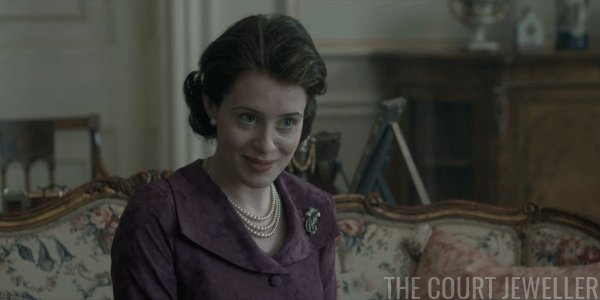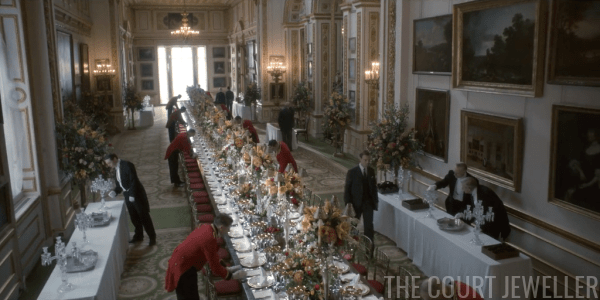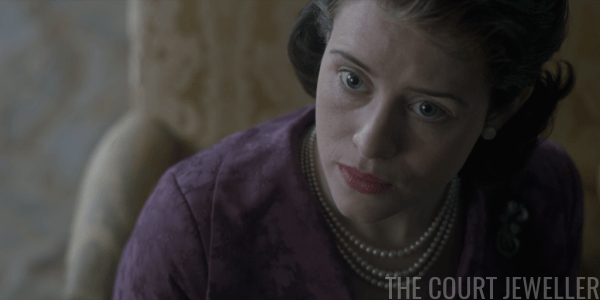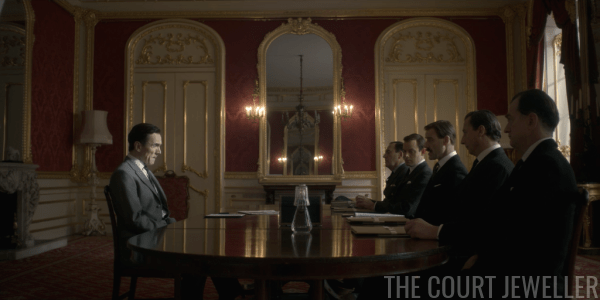
We’re back in government mode for episode seven of Netflix’s The Crown, but we’ve still got a few jewels to discuss here and there. If you’ve missed any of our earlier recaps, head over here! (And then come back to this post to discuss “Scientia Potentia Est” — which, fittingly, means “knowledge is power.”)

We begin with a brief flashback, this time to Windsor Castle, ca. 1940. The planes and barrage balloons overhead are reminders that war was raging in Europe, and British RAF pilots were attempting to save their country from the Luftwaffe during the Battle of Britain. (One of those pilots was, of course, Peter Townsend.)

Little Princess Elizabeth gets to ditch her etiquette lesson at the castle to pop over to Eton, where the Vice-Provost is instructing her on the finer points of the British constitution. Their discussion here focuses on the relationship between the government and the monarchy (the “essential” and the “dignified”). He explains that the relationship only works when the two sides trust each other.

Back in 1953, Elizabeth is having tea with her mother at the palace.

The Queen Mum, wearing pearls and her rings, is perusing the Daily Express. She brings up Albert Einstein — the looming threat of nuclear war hangs in the background of the entire episode, beginning with that visual of the barrage balloons — but neither she nor the Queen really know what he does, aside from a general understanding that he’s a scientist.

Elizabeth, wearing a single strand of pearls, pearl earrings, and one of the “inspired by” brooches, laments that she’s not better educated.

The Queen Mother, though, doesn’t see anything particularly wrong with that — it’s just the way things are. We get a better look at her triple strand of pearls and pearl cluster earrings in this view.

Tommy Lascelles comes to fetch the Queen for her audience with Churchill. On the way, they discuss his impending retirement. Elizabeth is dismayed and a little confused to learn that he’ll be replaced by Michael Adeane (his most senior deputy) rather than the more junior Martin Charteris. (Martin, you’ll remember was with Elizabeth when she became queen in Kenya.)

The corgis have been keeping Churchill company in Elizabeth’s absence. Mostly they’re watching him doze on the couch while he waits. He’s not in good health.

Regardless, he’s very worried about the Soviets and nuclear weapons. The Queen’s lack of wide-ranging education strikes again — he has to explain the basics of the threat to her. He’s sent Anthony Eden (the foreign secretary) to Washington to try to get the Americans to agree to a summit. (Churchill really was concerned with the nuclear threat, but again, the show is condensing and rearranging the timeline here. Churchill began pressing for this summit before the coronation.)

Churchill’s not the only one with health problems, though. Anthony Eden — who has fallen asleep here waiting for his meeting at the State Department — is extremely ill, thanks to a troublesome gallbladder. (This was also true, and it let Churchill take over more control as he basically took over Eden’s job, too.)

Back in London, Elizabeth steamrolls right past Tommy’s explanation about the “line of succession” for the private secretary job. Wearing another “inspired by” brooch and a triple strand of pearls, she invites Martin over for a conversation.

Here’s his face when she offers him the job outright. Wary, but also kind of excited. (Harry Hadden-Paton makes me miss Downton Abbey. PS: did you know that Harry’s real-life godmother is Sarah, Duchess of York?!? He’s not a stranger to this royalty business.)
The Queen also asks a favor of Martin — she wants him to find her a tutor.

After the meeting, Martin drives his wife, Mary, over to see the private secretary’s grace-and-favour apartment (where Tommy Lascelles still lives at this point, of course). In a classic case of measuring the drapes before buying the house, Mary asks Martin to have a tree trimmed outside the flat’s window.

Eden calls Churchill from America; he’s going to have to have surgery immediately. Churchill is furious that Eden’s health will delay the possibility of a summit. Eden, delighted that Churchill has revealed how important Eden is to the whole business, makes him tell him that he needs him over the phone. Churchill, promptly, has a stroke.
(Churchill really did have a stroke in 1953 — on June 23, to be more precise.)

At the palace, the Queen has no idea that her top two government officials are incapacitated. She’s doing her morning studying — take notes while reading The Sporting Life (a now-defunct racing paper).

Soon enough, though, the tutor that Martin has engaged shows up for their first meeting. Professor Hogg, who was nervous enough to swig from a flask before his arrival, asks Elizabeth to fill him in on what educational milestones she reached so that they can plan out their tutorial.

Elizabeth, rather ashamed, can’t give him any answers — she never took any exams or received any certificates.

Elizabeth is wearing her pearls in this scene, and as she has throughout the series, she pulls at the pearl necklace when she’s nervous. Here, the pearls begin to suffocate her when she confesses that she has trouble keeping up conversations with the people she meets as monarch.

She also wrings her hands during this scene, giving us a clear view of her rings and her watch. (The engagement ring still makes me sad.)

After their meeting is over, Elizabeth heads over to Clarence House, where she angrily confronts her mother about her lack of a formal education. The Queen Mum is in full Queen-Mum-mode, watching television and having a drink while wearing pearls, her rings, and a voluminous floral housecoat.

Elizabeth, who is wearing the “inspired by” bow brooch on her jacket, is highly critical, even when the Queen Mother points out that Elizabeth got a far better education than Margaret. (Yikes!)

The Queen Mother’s diamond ring flashes as she takes a drink here. The conversation devolves into an argument over what kind of education is proper — and who is a good parent.

Eventually, the Queen Mum rushes out of the room heads out of the room, leaving Elizabeth with her bow brooch and her thoughts.

Stuck in bed, Churchill makes Lord Salisbury and Jock Colville agree not to tell the Queen about his stroke. (If you recognize Colville’s name, it may be because he was the valiant man who traveled across London on the Queen’s wedding day to retrieve her pearls from the display of her wedding gifts.) Since Churchill and Eden are both incapacitated, Churchill has decided that the best course of action is to get Eisenhower to come to London. He wants the palace to dangle some state banquet bait in front of the American president.

None the wiser about Churchill, Elizabeth is back in the first “inspired by” brooch and her pearls as she works.

Tommy arrives to relay Churchill’s plan about the state banquet. The Queen is a little petulant about it — she’d wanted to go to Sandringham — but she eventually relents.

The press secretary succession problems continue, though. Michael Adeane has heard that Martin has been chosen as Tommy’s successor. Tommy figures out that Martin sent gardeners to trim that tree, and he is not happy about it.

State banquet preparations start in earnest, including my favorite: the footman who has to stand on the table with crazy mummy feet for polishing reasons.

Tommy calls Martin in to chastise him about both the job acceptance and the tree trimming. Nobody crosses Tommy Lascelles. Have these people not learned anything?

Meanwhile, the Queen is freaking out about having to meet and chat with President Eisenhower. She and Professor Hogg try to figure out a strategy, but he ends up needing time to research. Elizabeth only gets excited about any of this when she realizes that Hogg bets on horses.

Churchill has received a letter from the Queen telling him to recover quickly from his cold. Clementine, in her pearls, is appalled that they’ve kept this from the monarch. Then, Churchill finds out that Eisenhower has accepted the invitation to come to London, and he gets so worked up that he promptly has another stroke.

The banquet preparations are in full swing at the palace. (Here’s a true nerd moment from me, though: the setting is all wrong for a Buckingham Palace banquet. At BP, state banquets are held at a large, horseshoe-shaped table. The banquets with one long table are held at Windsor Castle.)

While everyone sets the (incorrect) table, Martin stops by to tell the Queen that everything has to be called off, because Eisenhower’s not coming after all. Much to Elizabeth’s dismay, he also turns down the private secretary job.

So Elizabeth rushes downstairs to confront Tommy about it. He gives her a lecture about tradition an continuity regarding all of the monarchy, including the staff. He also warns against “individualistic” decisions like the one she’s trying to make, where she’s thinking about her personal preferences rather than the health of the institution. Lascelles even gives her a rundown of the individualistic, egotistic decisions that Uncle David made that led to “rot” creeping in — and, eventually, the abdication.

Elizabeth is unhappy, but silenced on the matter. Even her pearly queen uniform is slightly askew.

As quickly as it was assembled, the banquet table is taken down.

With the private secretary mess still at the front of her mind, Elizabeth calls for her former private secretary, Jock Colville. She wants him to consult on the Adeane/Charteris issue.

But Colville, who works for Churchill now, thinks that she has found out about Churchill’s stroke, and he spills the beans. The Queen is furious that she’s been in the dark once again.

During a meeting with Professor Hogg, Elizabeth discusses her responsibility in light of Churchill’s incapacity. He encourages her to confront the government higher-ups, reminding her that all upper-class Englishmen respond well to scoldings from a nanny. To prepare for the meetings, Elizabeth sends staff to search all of the royal palaces for her notes from that meeting at Eton in 1940.

Churchill and Salisbury are quickly summoned to the palace.

The Queen asks for Salisbury first, making Churchill wait in the hallway. (It’s a different day, so she’s wearing a different dress, but the jewels are identical to the ones in the previous scene. They’re firmly part of her uniform here.)

She upbraids Salisbury for keeping the truth from her, using excellent words like “hampered” and “bamboozled.” She also drops a particularly excellent historical burn, telling him that she now doubts her father’s dislike of the old adage “never trust a Cecil.” (The Cecils have served monarchs since the days of the Tudors, to various degrees of loyalty. The 3rd Earl of Salisbury was involved in the Rye House Plot; the 4th Earl was locked in the Tower after the Glorious Revolution.)

Next, she summons Winston. He weakly enters the room and kisses her hand.

While she yelled at Salisbury, she pulls an even stronger move with Churchill — she’s disappointed. She feels betrayed by him.

She makes the Great Churchill cry! And with the help of her notes from Eton, she explains that she feels their trust has been broken — that crucial part of the relationship between monarch and government. She asks if he can continue. He says he doesn’t need to — she’s ready to move on without him now. But, you know, he’ll stay on anyway for now.

One person in the palace hasn’t gotten the memo about the cancelled state banquet: Philip, who has returned from a charity cricket match and gotten all gussied up, breeches and Garter and everything. He scrutinizes his wife and tells her that, somehow, she looks taller.

Here’s a look at his chest full of medals. Philip really did have all of these in 1953, and he has even more now.

Now that the banquet’s canceled, Philip proposes that Elizabeth schedule some personal time for him (except he says it in a much less family-friendly way).

Elizabeth agrees, even though she’s called Michael Adeane in for a meeting. He’ll have to wait until tomorrow.





































































































